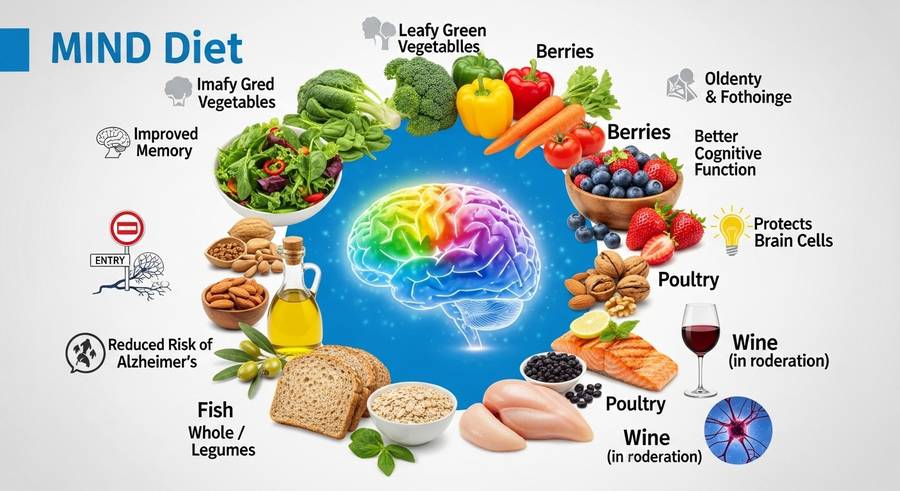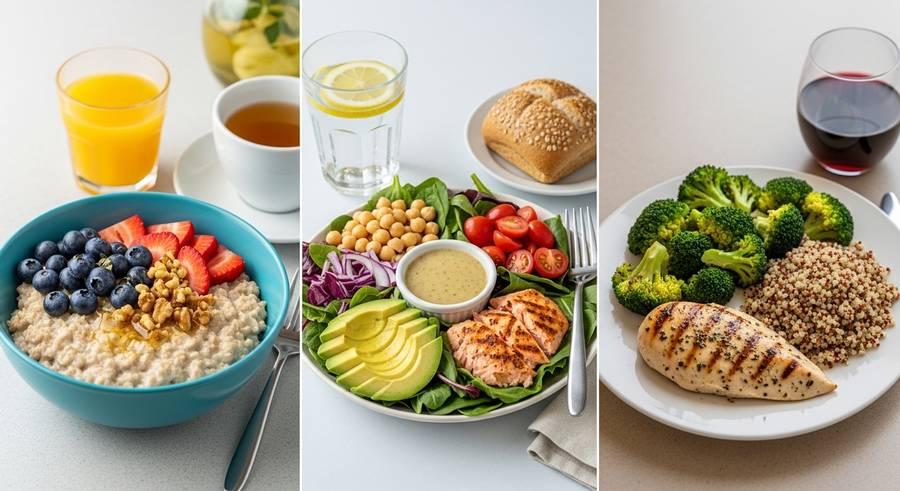
The MIND diet, a portmanteau of Mediterranean-DASH Intervention for Neurodegenerative Delay, is specifically designed to promote brain health and prevent cognitive decline, particularly Alzheimer's disease. It combines elements of the well-regarded Mediterranean diet and the DASH (Dietary Approaches to Stop Hypertension) diet, with a distinct focus on food groups shown through research to benefit the brain.
Core Principles of the MIND Diet
The MIND diet emphasizes a set of 15 dietary components, including 10 "brain-healthy" food groups to be consumed regularly and 5 unhealthy food groups to be limited.
Ten "Brain-Healthy" Food Groups
These food groups are the cornerstones of the MIND diet and are recommended for frequent consumption:
- Green leafy vegetables: Aim for at least six servings per week. Examples include spinach, kale, collard greens, and romaine lettuce.
- Other vegetables: Include at least one serving daily. This broad category encompasses all vegetables beyond leafy greens.
- Berries: Aim for at least two servings per week. Blueberries and strawberries are particularly highlighted for their high antioxidant content.
- Nuts: Include at least five servings per week. Walnuts, almonds, and pistachios are excellent choices.
- Olive oil: Use as your primary cooking oil. This provides monounsaturated fats beneficial for heart and brain health.
- Whole grains: Aim for at least three servings per day. This includes oats, quinoa, brown rice, and whole-wheat bread/pasta.
- Fish: Consume at least one serving per week. Fatty fish rich in omega-3s, such as salmon, mackerel, and sardines, are ideal.
- Beans: Include at least four meals per week. Legumes like lentils, black beans, and chickpeas are good sources of fiber and protein.
- Poultry: Consume at least two servings per week. Chicken and turkey are good lean protein options.
- Wine (optional): Up to one glass per day is suggested, primarily for its potential antioxidant benefits (though moderation is key and it's not recommended for everyone).
Five Unhealthy Food Groups to Limit
These food groups are associated with increased risk of cognitive decline and should be consumed sparingly:
- Red meat: Limit to no more than three servings per week.
- Butter and margarine: Limit to less than one tablespoon per day.
- Cheese: Limit to no more than one serving per week.
- Pastries and sweets: Limit to no more than five servings per week. This includes cakes, cookies, candies, and sugary desserts.
- Fried or fast food: Limit to no more than one serving per week.
Scientific Evidence Supporting the MIND Diet
Numerous studies have investigated the effectiveness of the MIND diet. Research published in journals like Alzheimer's & Dementia has shown that individuals who strictly adhere to the MIND diet have a significantly lower risk of developing Alzheimer's disease and a slower rate of cognitive decline compared to those who do not follow the diet.
One notable finding is that even a moderate adherence to the MIND diet can offer substantial protection against cognitive impairment. This suggests that incorporating many of its principles into your eating habits can yield positive results, even if perfect adherence isn't achieved.

Practical Tips for Adopting the MIND Diet
Integrating the MIND diet into your lifestyle can be achieved through gradual changes:
- Start with breakfast: Opt for whole-grain cereals with berries and nuts, or an omelet with vegetables.
- Snack wisely: Choose nuts or berries instead of sugary snacks.
- Make vegetables a priority: Include a salad or cooked vegetables with at least two meals a day.
- Experiment with fish: Try preparing salmon or mackerel once a week.
- Swap your cooking oil: Replace butter or other oils with olive oil for cooking and dressings.
- Choose whole grains: Opt for brown rice, whole-wheat pasta, and whole-grain bread.
- Increase bean intake: Add beans to soups, salads, or as a side dish.
- Reduce red meat consumption: Substitute poultry or fish for red meat more often.
- Be mindful of sweets and fried foods: Make them occasional treats rather than regular staples.
Conclusion
The MIND diet offers a practical and evidence-based approach to improving brain health and reducing the risk of cognitive decline. By focusing on a nutrient-rich, plant-forward eating pattern, individuals can actively support their memory and cognitive function throughout their lives.
Connect with Us
Follow this page for updates, wellness tips, and more information about Our Products Share your experiences and join our community!
You can order your Products directly from a certified APLGO distributor or via E-mail me at Mfrost9345@yahoo.com
Want to Share Wellness & Earn?
You can become an Associate— earning income while helping others feel better too.
Get product discounts
Earn commissions from referrals
Grow a wellness business with a purpose
It’s more than just joint relief. It’s an opportunity.
Call to Action
Try Our Products Today —
Message now for guidance, specials, or to place your order.
Know someone Else that can Benefit? Share this blog with them — they’ll thank you.
🛒Place your order here as customer
Become a Business Owner for $25
Text for more info: 1-443-907-0033
Back to Table of Contents
Botanical Products Reviewed by Nutritional Physiologist Mary Esther Gilbert
Scan QR code to become a business owner for $25

ADVERTISEMENT

Unlock Your Mind's Potential with Brain-Boosting Nutrition
Experience enhanced cognitive clarity and mental alertness with BRN, a powerful blend designed to support your brain health and manage everyday mental stress. Combine this with HPY for a synergistic effect, promoting calm, boosting mental clarity, and supporting your overall well-being through a refreshing mix of natural ingredients like ashwagandha and chamomile. Together, these APLGO products offer a delicious and convenient way to nourish your mind and achieve a greater sense of balance.
